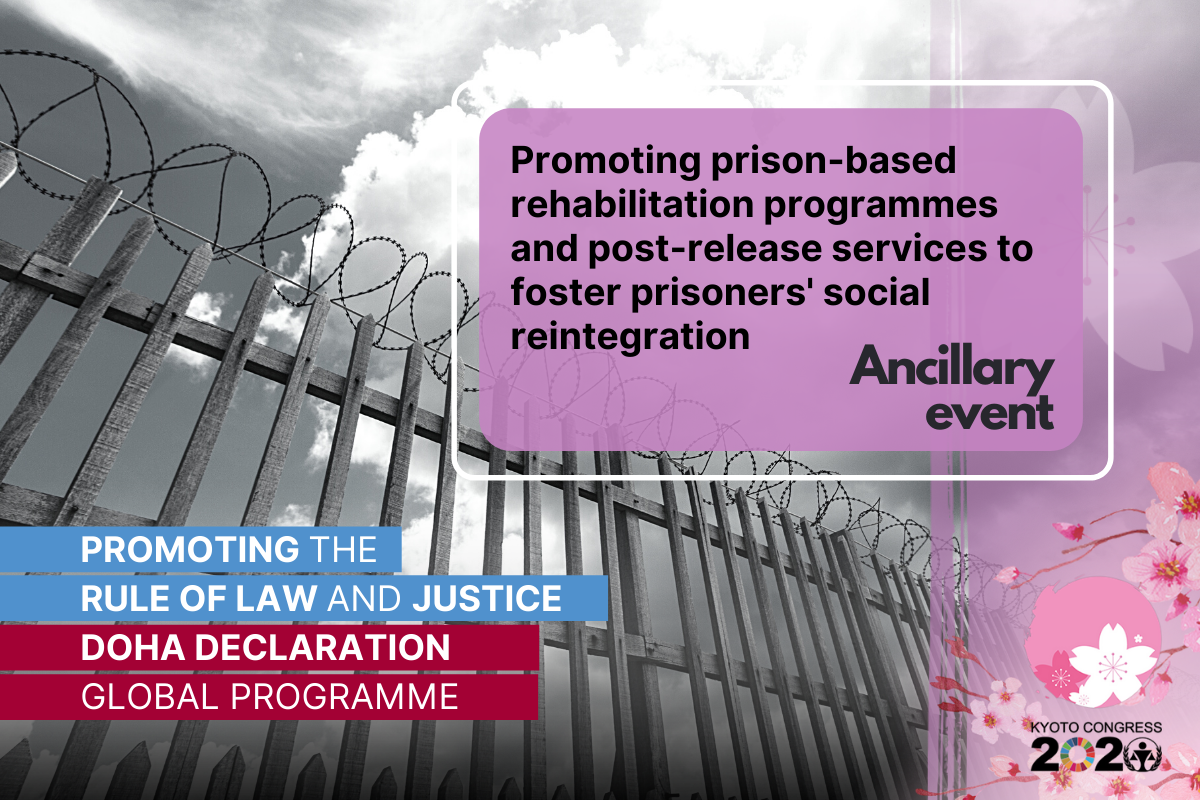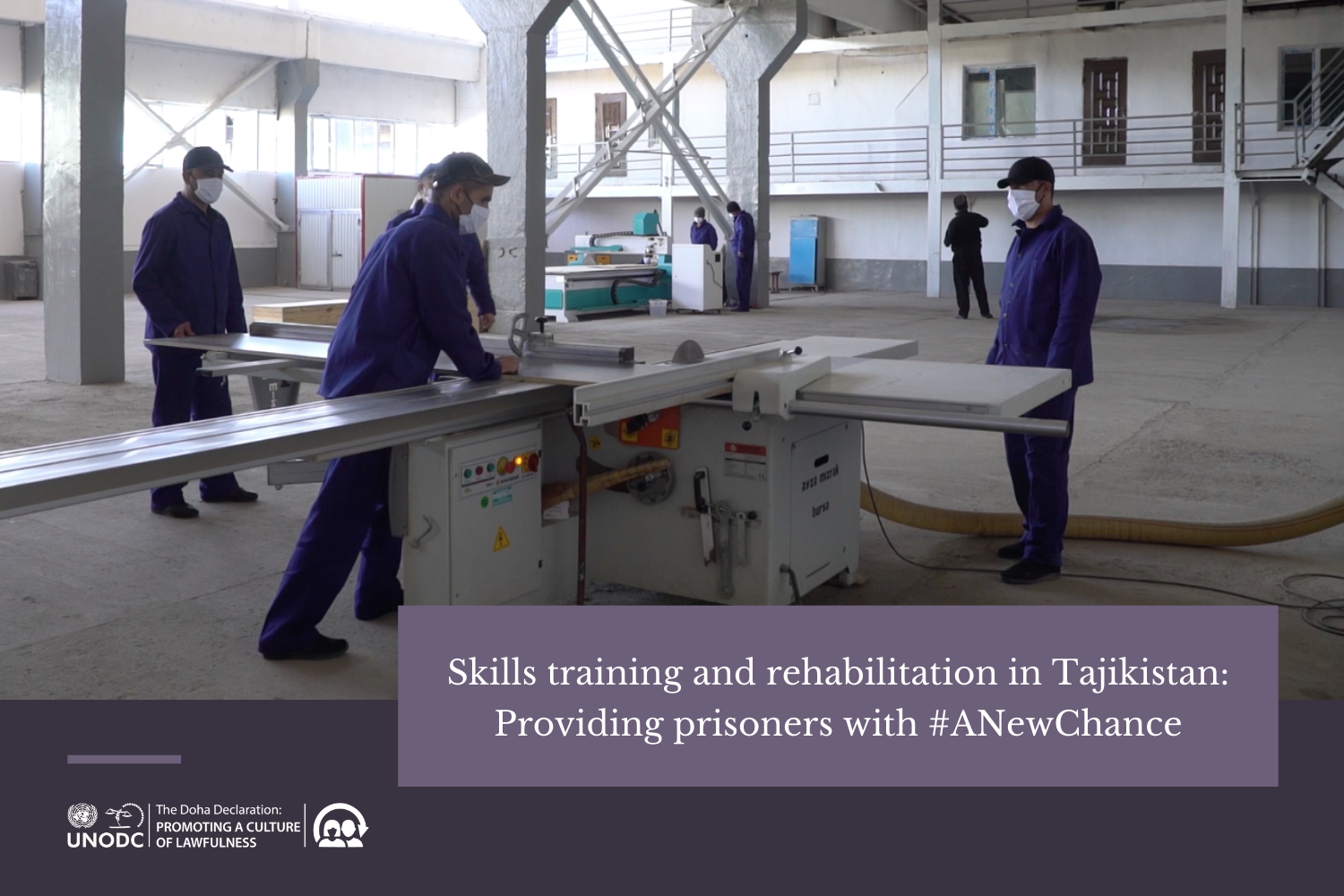Strengthening offender reintegration in Asia: UNODC and Singapore conduct regional training workshop on correctional rehabilitation
11 October 2018 - Prisoner rehabilitation is both key to protecting society from crime as well as helping prisoners be better prepared for their release. Towards this, training and reintegration initiatives, coupled with post-release support, are essential towards reducing recidivism.
Working to this end, UNODC and the Government of Singapore recently conducted a joint regional training workshop on correctional rehabilitation, bringing together some 63 officials from 16 Asian and Pacific Island countries who are integral in their areas for prisoner rehabilitation activities.
Valerie Lebaux, Chief of UNODC's Justice Section, opened the workshop with an apt scene-setter, recalling in particular the Nelson Mandela Rules. Highlighting that an essential purpose of imprisonment is to reduce recidivism, and noting that the period of imprisonment should be used to ensure the reintegration into society upon release, she spoke of "UNODC's support to Member States in developing prison-based rehabilitation programmes, through education, vocational training and work, in line with international standards."
Over the course of two days, participants were briefed on a number of approaches to reducing offender recidivism through rehabilitation and reintegration. Experts from UNODC presented international standards applicable in this field, sharing examples of the organization's health-related activities in the region's prisons as well as showcasing the recently released ' Roadmap for the development of prison-based rehabilitation programmes' which is now available online.
 Psychologists and correctional rehabilitation specialists from the Singapore Prison Service (SPS) meanwhile highlighted how they have been developing and implementing science and evidence-informed approaches to reduce re-offending. A visit to the SPS's Pre-Release Centre was organized to enrich the participants' understanding of rehabilitation methods in the country.
Psychologists and correctional rehabilitation specialists from the Singapore Prison Service (SPS) meanwhile highlighted how they have been developing and implementing science and evidence-informed approaches to reduce re-offending. A visit to the SPS's Pre-Release Centre was organized to enrich the participants' understanding of rehabilitation methods in the country.
"Complementing the teaching segments, participants also shared their experiences, challenges and aspirations to improve rehabilitation practices in their respective jurisdictions", noted Timothy Leo, Chief Psychologist in the Singapore Prison Service. "We value the opportunity to collaborate with UNODC to provide the space for mutual learning, inspiration and collegiality among correctional professionals in the region."
The workshop proved a useful forum to network and exchange best practices with experts, officers, researchers and practitioners in the field of corrections. A number of attendees spoke afterwards of the benefits of these fora.
"I found this conference a very fruitful one," said Dy Chamroeun, Deputy Director of the General Department of Prison of Cambodia. "I picked up valuable information and knowledge… (with the) visit to Changi Prison very practical and insightful." Meanwhile the Assistant Commissioner of the Fiji Corrections Service, Salote Panapasa, praised the gathering. "We are happy about the workshop we attended. We have two things that we need to take back home. Firstly, on operational rehabilitation, we need to strengthen our capacity building and perspective, to ensure that all officers know their role and implement the tasks they are supposed to do. Secondly, we have some policies in places that have reached maturity implementation, that we need to review by using the new logic model. We just did an exercise last night, particular on our rehabilitation policy, and reviewed our programmes undertaken by our recidivists and sex offenders."
 The workshop was jointly organized by UNODC and Singapore under ongoing initiatives to boost prisoner rehabilitation. From UNODC's side, the workshop was held under
Global Programme for the Implementation of the Doha Declaration, funded by the State of Qatar, which promotes a culture of lawfulness and respect for the rule of law. From Singapore, it benefitted from the support of the
Singapore Cooperation Programme (SCP) - the country's primary platform in extending technical assistance to the developing world which, since its inception in 1992, has organized training courses, workshops, seminars and study visits for more than 120,000 foreign Government officials from 170 countries.
The workshop was jointly organized by UNODC and Singapore under ongoing initiatives to boost prisoner rehabilitation. From UNODC's side, the workshop was held under
Global Programme for the Implementation of the Doha Declaration, funded by the State of Qatar, which promotes a culture of lawfulness and respect for the rule of law. From Singapore, it benefitted from the support of the
Singapore Cooperation Programme (SCP) - the country's primary platform in extending technical assistance to the developing world which, since its inception in 1992, has organized training courses, workshops, seminars and study visits for more than 120,000 foreign Government officials from 170 countries.
In addition to the workshop and prison visit, participants also attended the Yellow Ribbon Conference held immediately after, benefiting from various Singaporean agencies sharing their research and best practices on prisoner rehabilitation and reintegration.
Additional information:
CARE Network (Singapore)
Prisoner rehabilitation (UNODC)
Roadmap for the development of prison-based rehabilitation programmes (UNODC)
The Nelson Mandela Rules (UNODC
)
UNODC prison tools and publications (UNODC)
Yellow Ribbon Project
(Singapore)


